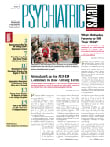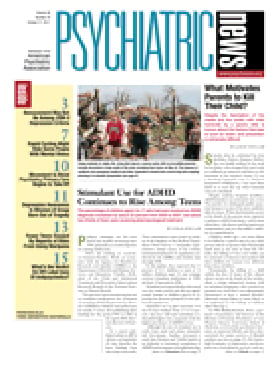Are people in poorer countries more depressed than people in richer countries?
No, a World Health Organization study reported online in BMC Medicine on July 26 suggested.
Indeed, they appear to be even less depressed.
The senior investigator was Ronald Kessler, Ph.D., a professor of health care policy at Harvard Medical School.
On the surface, this finding is very surprising, Kessler told Psychiatric News. "Wouldn't we expect people in very poor countries to be sad about their comparatively—that is, in comparison to richer countries—low rates of income? That would certainly be the common-sense expectation.
"But what we're coming to find increasingly," he explained, "is that local comparisons [not international ones] are the important ones for people. People who make $2 a day in places where the average person makes $1 a day generally have the low rates of depression found among people making $1,000 a day in places where the average person makes $500 a day.... This implies that the subjective meaning of social status is at least as important, if not more so, than a person's objective financial circumstances" in assessing their depression risk.
This finding is encouraging, he said, "because it is a lot easier to help people find ways in which to experience themselves as having high status—say, mentoring a young person—than in actually helping them make a lot of money."
The study included about 90,000 people living in 18 countries on five continents. Ten of the countries—Belgium, France, Germany, Israel, Italy, Japan, the Netherlands, New Zealand, Spain, and the United States—were high income. The remaining eight—Brazil, China, Colombia, India, Lebanon, Mexico, South Africa, and Ukraine—were low to middle income.
Representative samples of people in each of these countries were asked several diagnostic questions, such as whether they had ever been depressed most of the day for nearly every day. About half said that they had, suggesting that they may have experienced a major depression at some point. These individuals were then interviewed more fully with the World Health Organization Composite International Diagnostic Interview (CIDI) to assess whether they had ever had a DSM-IV major depressive episode.
Based on subjects' positive responses to the diagnostic stem questions, the estimated lifetime prevalence of a major depression was estimated to be 20 percent in low- to middle-income countries and 28 percent in higher-income ones. When looking at responses from subjects who responded positively to the diagnostic stem questions and who were then interviewed with the CIDI, the lifetime prevalence of a DSM-IV major depression was 11 percent in low- to middle-income countries and 15 percent in higher-income ones.
Thus, findings from both phases of the study suggested that people in low- to middle-income countries tend to have less depression than people in higher-income countries.
The study was funded by the U.S. National Institutes of Health, various countries' ministries of health, the World Health Organization, the Pan American Health Organization, the Fogarty International Center, various foundations, four pharmaceutical companies, and other sources.


